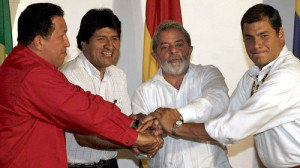Carlos Sánchez Berzaín
January30, 2018
 (Interamerican Institute for Democracy) The ruling issued by the Federal Regional Tribunal from Porto Alegre, Brazil, unanimously ratified the guilt of Luis Inácio Lula da Silva for “passive corruption and money laundering” with the construction company OAS in the “Lava Jato” scandal and extended his sentence from 9 to 12 years of jail. It is a message to Lula’s associates in the regimes of Cuba, Venezuela, Bolivia, Nicaragua, Ecuador, and others. Judge Leandro Paulsen asserted “Let it be understood by all that … without regard of how high the pedestal that puts you in power may be, THE LAW will always will be above you.”
(Interamerican Institute for Democracy) The ruling issued by the Federal Regional Tribunal from Porto Alegre, Brazil, unanimously ratified the guilt of Luis Inácio Lula da Silva for “passive corruption and money laundering” with the construction company OAS in the “Lava Jato” scandal and extended his sentence from 9 to 12 years of jail. It is a message to Lula’s associates in the regimes of Cuba, Venezuela, Bolivia, Nicaragua, Ecuador, and others. Judge Leandro Paulsen asserted “Let it be understood by all that … without regard of how high the pedestal that puts you in power may be, THE LAW will always will be above you.”
There is Rule of Law when “the law is above those who govern, and not the other way around, and because of that the law is equally applied amongst all citizens”. This is about recognizing that “any power be limited by law that not only conditions its manner of enforcement but also its content”. One of the signs of the existence of the “Rule of Law” is the separation and independence of the branches of government given the fact that both; the Rule of Law and the separation and independence of the branches of government, are essential components of democracy. This is why the decision of the Brazilian judges in Lula’s case, is a clear demonstration of the strength of democracy in Brazil, something wished for and even envied for, by many nations of the region.
Extending Lula’s sentence is a “red flag” to the corruption network established in Brazil and spread throughout the Americas that began with the “Forum of Sao Paolo” and its political birthing of the 21st Century Socialism, known today also as “Castroist-Chavist”. During his government, Lula received from the OAS construction company a triplex apartment in the resort of Guarujá, valued at $1.2 million dollars in exchange for OAS contracts with Petrobras such as the Abreu e Lima refinery that Lula inaugurated together with Hugo Chavez.
Lula’s case is part of the “Lava Jato” scandal, the greatest transnational political corruption scandal, a network of organized crime established with political objectives from the “Forum of Sao Paolo” to enrich Castroist-Chavist governments who -with those illicit funds- manipulated elections and communications media, violated and violates human rights and destroyed democracy in Venezuela with Chavez and Maduro, in Ecuador with Correa, in Nicaragua with the Ortega’s, in Bolivia with Evo Morales, in Argentina with the Kirchner’s, and in several of the Petro-Caribbean countries, under the control of the Castro’s Cuban dictatorship.
The investigation into “Lava Jato” revealed that “members of the Brazilian government (Lula) spread this network of “under the table” payments so that the larger construction companies of that country be awarded sizeable contracts throughout Latin America”. The case that is most widely known is that of Odebrecht, but around fourteen other Brazilian construction companies are under investigation. This is the case of the OAS construction company in Bolivia with projects and contracts publicly promoted by Lula and Evo Morales, such as the construction of a highway that encroaches into and destroys a protected indigenous reserve known as the “TIPNIS” in order to expand the illicit cultivation of coca.
Lula’s sentence is a clear signal to the chief of the monumental mechanism “for the internationalization of corruption” under the Cuban’s dictatorial doctrine who schemed so that “never again be lacking money to pursue revolutionary efforts” which is nothing more than to destroy democracy. Besides snarling the regimes of Venezuela with Chavez and Maduro, Nicaragua with the Ortega’s, and Bolivia with Evo Morales that are nowadays known as dictatorships, this corruption touched and corrupted practically the entire region, as was revealed in the cases of the Kirchner’s in Argentina, Toledo, Humala and others in Peru, the higher echelons of Correa’s regime in Ecuador that still continue to protect Correa, the cases of Panama, Dominican Republic, Mexico, and others.
Brazilian judges have concluded that “there is more than reasonable proof that the former president (Lula) was one of the masterminds, if not the main one, to create a vast corruption network”. Lula’s legal defense stands no chance, this is why it has focused on politicizing the trial thus far to no avail due to the existence of the “Rule of Law”, the seriousness and independence of the judges, and the weight of the proof. Judge Joao Gebran Neto, a member of the court that extended Lula’s sentence, denied an alleged persecution by the Judicial Branch asserting that “the Judicial Branch cannot be guided by the political consequences of this type of trials.”
Published in Spanish by Diario las Américas on Sunday January 28th, 2018
Translated from Spanish by: Edgar L. Terrazas, member of the American Translators Association, ATA # 234680.
 Carlos Sanchez Berzain Abogado | Estadista | Político | Politólogo
Carlos Sanchez Berzain Abogado | Estadista | Político | Politólogo